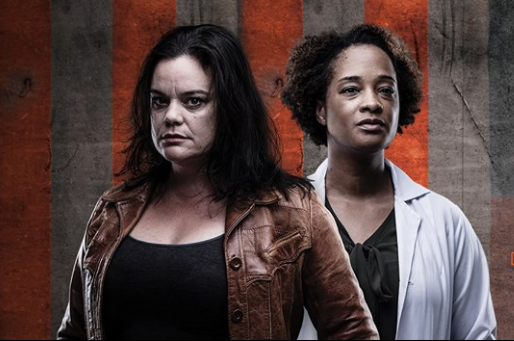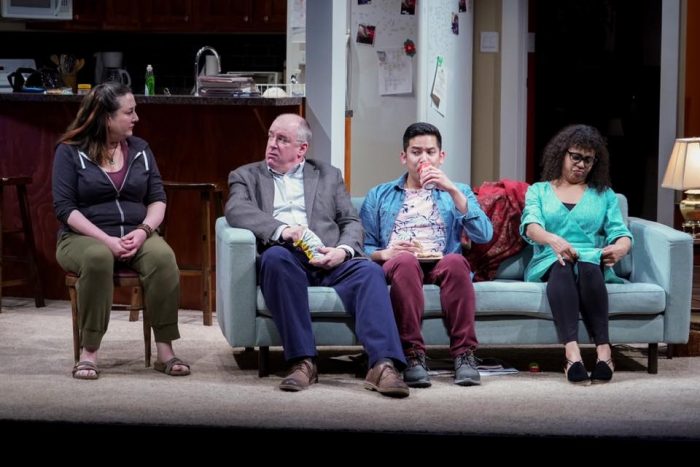
L-R: David Quicksall (Rene Gallimard) and Tom Dang (Song Liling) in ArtsWest’s production of M. BUTTERFLY. Photo by John McLellan.
Review: M. BUTTERFLY by David Henry Hwang. Produced by Arts West. Directed by Samip Raval. Choreography by Alyza Delpan-Monley. Scenic Design by Lex Marcos. Lighting Design by Emily Leong. Costume Design by Natalie Shih. Sound Design by Brian Murphy. Properties Design by Andrea Spraycar. With David Quicksall, Tom Dang, Marianna De Fazio, Rachel Guyer-Mafune, Kathy Hsieh, Jason Marr, Mark Waldstein, Margaret Hotchkiss, Ayako Shapiro. Now through February 17, 2019 at ArtsWest Playhouse and Gallery/West Seattle.
Two plays opened this past weekend. One is new and one revisits a popular older work…sadly, revisiting old friends can be painful.
The “old friend” is ArtsWest’s production of David Henry Hwang’s M. BUTTERFLY, his 1988 Tony Award winning/Pulitzer Prize runner up play about a male French diplomat who falls in love with a Chinese opera star who was born male but is presenting as female, despite it being taboo in Communist China (the play is set over a period of time from the 1960s through the 1980s). Based on a true story, Hwang has shifted the real bits around to fit his theme of “Western society (mostly men) fetishizing Eastern/Asian culture and people (mostly women) for their own gratification”. The play’s title is an obvious play on the title for the Puccini opera Madame Butterfly which depicts those same themes. Hwang made changes to his script for the 2017 Broadway revival of the play, to reflect changes in how we speak of transgendered people and it’s this version that ArtsWest debuts.
M. Butterfly opens with Rene Gallimard in prison for his affair with Song Liling, a born male/female presenting actor in a Peking Chinese opera company and then proceeds to tell his story; the play is basically one long flashback. Rene has long had a fascination for Asian women and after being posted to Peking in the early 1960s, he begins an affair with Song Liling, seemingly unaware that Song was born male. We also learn that Song is spying for the government and using Rene to gain information on the war in Vietnam. Song even goes so far to claim pregnancy and produces a child but eventually Rene is sent back to Paris and the two are parted for many years, with Song imprisoned and tortured under the Cultural Revolution. Years later, Song manages to reconnect with Rene, and joins him in Paris, where the espionage is continued until the pair are found out and Rene claiming he never knew the truth about Song.
Shockingly, this was my first visit with M. Butterfly…I haven’t even seen the film version with Jeremy Irons. Like many plays from the 80s and 90s, the material feels very long; the norm was for plays to run well over two hours or more (nowadays, many new plays tend to run one act and 75 to 100 minutes). I don’t know if it’s due to the way we present/see theater but now, when you visit an older play with a generous running time, it can seem draggy and slow. While I think that M. Butterfly could benefit from a trim or two (there’s some redundancy, especially towards the end) the pacing of the material is also tied to the direction and the acting in an individual production…and, sadly, the main problem with this production of M. Butterfly is just that. Samip Raval’s staging is stagnant and ill-focused; there’s awkward transitions between many of the scenes in the play. And, the pacing is just glacial at times especially in the beginning and at the end and I’m afraid lead actor David Quicksall has to share in the responsibility for this leaden pacing. As Rene Gallimard he really has the task of keeping the momentum going and frankly, that never really happened.
There’s also a lack of chemistry between the two main characters. Tom Dang, as Song Liling, manages to make his character a multi-dimensional believable personality but the connection between his Song and Mr. Quicksall’s Rene seems forced at best. I think part of the problem is in how David Henry Hwang rather simply portrays Rene as a heterosexual boob with a rather limited fixation on the “ideal Asian woman”….in my opinion the character seems rather stupid and the actual person the character is based on, is far more interesting ( the real Rene was bisexual; he had a male lover while seeing the real Song and the pair were both knowingly involved with the espionage). I understand Mr. Hwang’s intent to focus on his themes about Madame Butterfly and problematic representations of Asian peoples and culture but…sometimes the truth is more interesting.
The production features a talented supporting cast (all playing a number of ensemble roles) including Jason Marr as an oafish peer of Rene and Kathy Hsieh having fun as a fanatical Communist Party member overseeing Song’s espionage who might verbally denounce Song’s luxurious and decadent Western wardrobe while fondling the lace and satin with a great deal of appreciation.
The handsome set by Lex Marcos features sliding rice paper panels and it’s all lushly lighted by Emily Leong. Natalie Shih’s carefully color coordinated costumes have to embrace 60s Euro modernity as well as colorfully theatrical Chinese costumes and it all blends together superbly.
M. Butterfly has some lovely things going for it, mainly in the design department, but its sluggish direction and central performance make it a miss for me.

Kathryn Van Meter and Dedra D. Woods star in FIRE SEASON at Seattle Public Theater now through February 17, 2019.
Review: Fire Season by Aurin Squire. Produced by Seattle Public Theater. Directed by Kelly Kitchens. Scenic Design by Julia Welch. Costume Design by Chelsea Cook. Lighting Design by Thorn Michaels. Sound Design by Evan Mosher. Properties Design by Robin Macartney. With Alyson Scadron Branner, Mike Dooly, Ray Gonzales, Martyn G. Krouse, Pablo Lopez, Sofía Raquel Sánchez, Kathryn Van Meter, Dedra D. Woods. Now through February 17, 2019 at the Bathhouse Theater at Green Lake.
There’s a lot more heat going on at Seattle Public Theater as they debut a new play, the recipient of the Emerald Award, which gives an emerging playwright a full production of a new play. In this case, it’s FIRE SEASON by Aurin Squire, a very much up and coming young writer who has already debuted several plays as well as worked on NBC’s hit show THIS IS US and CBS’s THE GOOD FIGHT.
Despite being from south Florida, Squire sets Fire Season in a location quite near though not so dear to us, Concrete, Washington, a part of the state known for great natural beauty but also for extreme poverty and issues with drug addiction, including opioids. Rather like a teleplay, the play features multiple characters and story lines all intertwined into a complicated narrative that mostly deals with the opioid addiction crisis in the United States but also income inequalities, veterans, abortion and the plight of rural America.
Fire Season is apparently meant to focus on two main characters: a female African American medical doctor (based on the playwright’s sister and her real life experiences) and a middle aged working class mother coping with the death of her 12 year old son due to a painkiller overdose. We quickly learn that Dr. Anne Cormack is in trouble for losing her prescription pad; she’s being investigated to determine if she’s guilty of a deliberate crime or negligence. Meanwhile, Elizabeth is falling apart after the death of her son…she’s unable to stay long in her apartment and has taken to sleeping in her car to avoid being very long in the place where her son died. And, she’s angrily demanding that the manager of the Wal-Mart she works at, lower the store’s flag to half mast to honor his death. Naturally, that doesn’t go over well with Wal-Mart or the persnickety by the book manager Phil.
We are also introduced to a number of supporting characters including a long lost flame of Elizabeth’s…Curtis a veteran of the war in Afghanistan coping with serious PTSD and nerve damage and his opioid addiction. He’s also financing his addiction by dealing painkillers despite the fact he’s currently wearing a leg monitor while serving time for a prior arrest.
There’s also Elizabeth’s surviving 16 year old son Ricky and his girlfriend Jessamyn who dream of traveling the world together but are hampered by the fact they’re poor and even worse, Jessamyn is pregnant. Ricky is also dealing with the loss of his younger brother and a very complicated relationship with his mother; Elizabeth has been a lax mom and Ricky was largely left to raise himself and his little brother.
Other characters wander into Concrete including an officious investigator checking into Dr. Anne’s claims she didn’t deliberately lose her prescription pad, as well as a homeless veteran and the town’s main drug peddler. All the characters interact and play off each other over the course of the two acts of the play but really only one character emerges as the driving force (and the main reason to see Fire Season).
It’s Elizabeth, the very complicated, grieving/enraged, bulldozer, working class mom that emerges as the pain filled center of the play, with most of the other characters revolving around/reacting to her energy and fury over the death of her son. Mr. Squire has done an excellent job in the creation of Elizabeth…she really does feel REAL, like a person you might have known in your life. She’s a huge mess and more than likely manic depressive and she’s very imperfect but the character is all the more believable because of those things. To be honest, I think the only thing that rings as inorganic about her, is the plot point of her insisting on the flag being lowered to honor her dead son. I get that she’s supposed to be unreasonable about this due to her fury and grief but….it still felt a bit contrived for plot purposes. Why would a store lower a flag for a 12 year old and why should anyone expect them to do so? And, it’s not my place to suggest a plot change but…simply changing the dead son from a 12 year old to a 19 year old who had been kicked out of the military for drug issues would have solved that problem.
In my opinion.
The other main weakness in the script is Mr. Squire trying to shoehorn the female doctor character into a center role. According to an interview (printed in the program for the production) the doctor character is based on the writer’s sister and the play originated with her story…but, frankly, the story of the grieving mom is more interesting with the result the doctor character now feels like it’s being forced into being a larger character than it needs to be. Elizabeth’s multiple stories…fighting for the flag lowering and her fractured relationship with her son and dealing with his issues, and her newly reconnected relationship with the Curtis character are more than enough plot…cutting back on the doctor would give a bit more space to deal with some loose ends with all those threads.
There’s also an issue with the characterization of Phil, the Wal-Mart manager which is inconsistently written…at times, he’s just a boob but later on in a job interview situation with Curtis, he comes across as ridiculously obtuse and offensive (asking a war veteran very tacky questions about being in combat situations) but not in any way that’s believably consistent…by the end of the play, the character is in a scene where he’s seemingly very aware and intelligent about veterans. I think the playwright is trying to create a multi-dimensional character (“awful” people aren’t all awful; everyone is multi-dimensional in their personalities) but unlike the Elizabeth character, who is very flawed yet still feels based in reality, Phil comes across less successfully.
All that said, Fire Season is still dramatically compelling…to be obvious about it, it “crackles” with passion and intensity, mostly due to the Elizabeth character. It’s certainly a timely play, not just with the obvious theme of painkiller addiction, but since the play is set in Washington State in a rural forested area, there’s also the added environmental issues of summer time forest fires featured in the plot as well. There’s a lot of interesting things going on in Fire Season and Mr. Squire has created a piece of drama with a lot of potential after a bit of tightening and clarifying.
It’s also well staged by Kelly Kitchens with strong design work from the Seattle Public team . The entire ensemble of 8 actors is also quite strong with Alyson Scadron Branner and Ray Gonzales both making all the various small ensemble roles interesting and unique individuals, especially Ms Scadron Branner’s chilly investigator and Mr. Gonzales’ oily/swarmy drug dealer. Sofía Raquel Sánchez and Pablo Lopez as the teenaged lovers are also quite good, with Ms Sánchez nicely playing the naiveté of Jessamyn as well as the shock of that character dealing with some harsh realities of life. Mr. Lopez is also very compelling as Ricky, coping with adult situations with his girlfriend, but also a very fractured relationship with his mother.
As stated, I think both the Doctor character and Phil, the manager both need some re-tooling but Dedra D. Woods and Martyn G. Krouse do fine jobs portraying these characters, flawed they might be. The characters need sharpened but the performances are strong due to these actors.
Mike Dooly is great as the traumatized veteran/drug dealer/love interest for Elizabeth. His scene with Phil the manager, where he has to deal with talking to an idiot he despises while trying to remain calm in order to clinch a job he badly needs, is nicely played as he has to play so many different levels all at the same time. And, a major confrontational scene with the Elizabeth character demonstrates that good acting also involves RE-acting to another character dominating the scene. It’s the kind of fine work we expect from Mr. Dooly in all his performances.
But, this is really Kathryn Van Meter’s moment to shine. The longtime actor and choreographer has focused her recent career on choreography and direction of musical theater but her center stage bravura performance as Elizabeth reminds us of the powerhouse actor she can be. Ms Van Meter channels all of Elizabeth’s rage and fury and intelligence and passion into creating a very real representation of a very real flawed human being. Her performance is the heat that drives Fire Season. It’s one of those impressive jaw dropping performances that you cannot afford to miss.
Fire Season has a smart script (that needs a bit more work), a well produced production by Seattle Public Theater and a fantastic company of actors headed by Kathryn Van Meter’s towering performance. It’s reason enough to check it out. Most highly recommended.



















